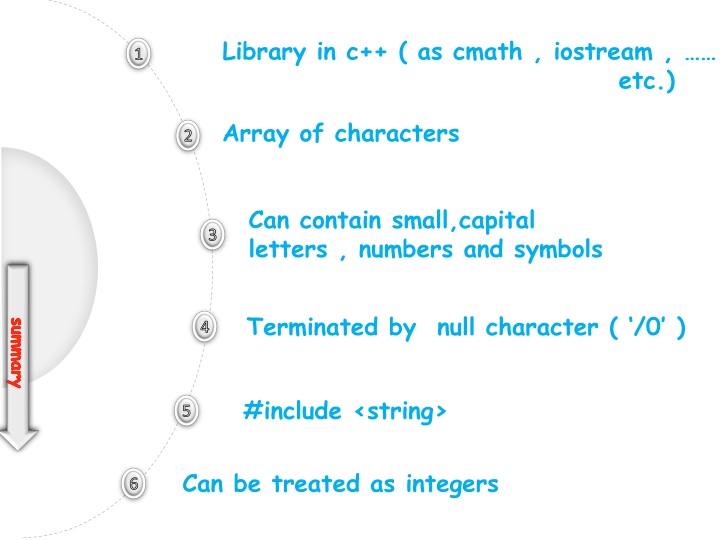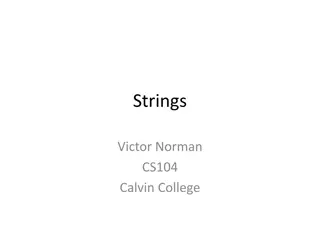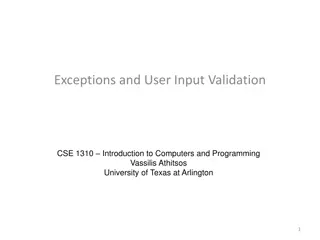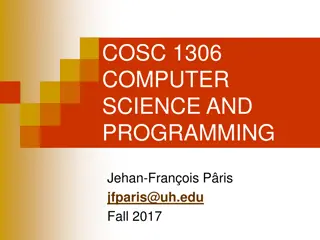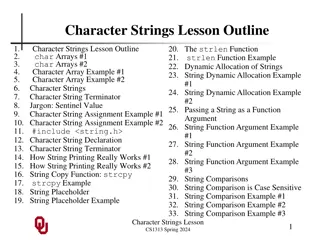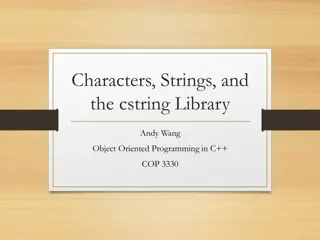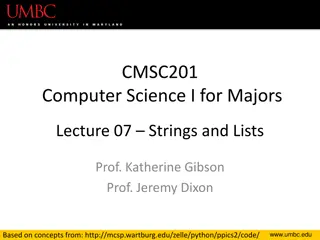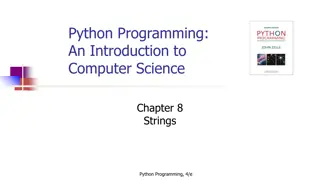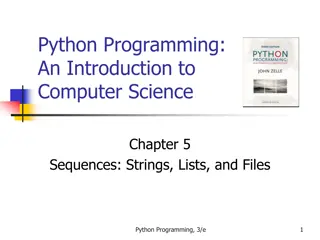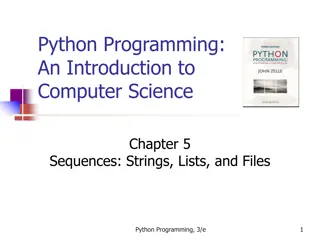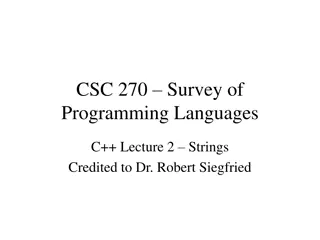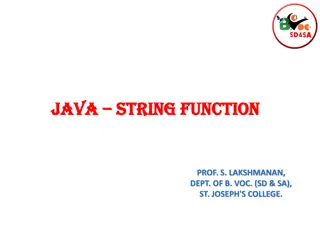Introduction to Strings in C++ Programming
In C++, strings are arrays of characters that can hold letters, numbers, symbols, and end with a null character ''. String manipulation involves operations such as assignment, concatenation, comparison, and input/output. The declaration, initialization, and basic operations on strings like joining, concatenating, and equality checks are outlined. Additionally, memory representation and examples of string handling in C++ are provided.
Download Presentation

Please find below an Image/Link to download the presentation.
The content on the website is provided AS IS for your information and personal use only. It may not be sold, licensed, or shared on other websites without obtaining consent from the author.If you encounter any issues during the download, it is possible that the publisher has removed the file from their server.
You are allowed to download the files provided on this website for personal or commercial use, subject to the condition that they are used lawfully. All files are the property of their respective owners.
The content on the website is provided AS IS for your information and personal use only. It may not be sold, licensed, or shared on other websites without obtaining consent from the author.
E N D
Presentation Transcript
Library in c++ ( as cmath , iostream , 1 etc.) Array of characters 2 Can contain small,capital letters , numbers and symbols 3 Terminated by null character ( /0 ) summary 4 #include <string> 5 Can be treated as integers 6
String is a sequence of characters ending with NULL '\0' char greeting[6] = {'H', 'e', 'l', 'l', 'o', '\0'}; If you follow the rule of array initialization, then you can write the above statement as follows: char greeting[] = "Hello"; Following is the memory presentation of above defined string in C++: Actually, you do not place the null character at the end of a string constant. The C++ compiler automatically places the '\0' at the end of the string when it initializes the array.
String declaration: before declaring a string we need to call the string header library as following: #include<string> char a[4]="abc"; // == char a[4]={'a','b','c','\0'}; String x ( highschool ) ; String x = highschool ; String x ; x = highschool ;
Operations on strings Operator Working = Assignment + Joining two or more strings += Concatenation and assignment == Equality != Not equal to < , > Less than , greater than <= Less than or equal >= Greater than or equal
String Input: We can use the (cin) to input string as any other data types: cin>>s; cin>>s[i] ; Example: #include<iostream> #include<string> Main(){ char word[80] ; Do{ cin >>word ; Cout << "\t << word << endl ; } while (word!=0)}
Example: a program to read a string and print its elements: #include <iostream> #include <string> int main() { char s[]= "ABCDEF ; for (int i=0;i<7;i++) cout<<"s["<<i<<"]= <<s[i]<<endl; } Output : s[0]='A' s[1]='B' s[2]='C' and so on.
String functions Most common : 1- length 2- Copy 3- Concatenation 4- Compare 5- Assignment
) Assignment Assign()) #include <iostream> #include <string.h> using namespace std ; int main () { string s1 ("c plus plus "); string s2,s3,s4 ; s2.assign (s1) ; s3.assign (s1 , 0 , 6) ; s4.assign (s1 , 4 , 2) ; cout << s2<<endl<<s3<<endl<<s4 ; return 0; } Out put : c plus plus c plus us
Length function ( strlen ) strlen(str) used to find the length of string, i.e., the number of characters excluding the null terminator. Ex.: strlen("ABC") output : 3 (integer number). Ex.: int length; char a[]="XYZW"; length=strlen(a); output: 4.
#include <iostream> #include <string> Using namespace std ; int main () { //length () : determinates the length i.e. no. of characters string s1 ; cout << length : << s1.length () <<endl ; s1 = hello ; cout << length : << s1.length () << endl ; return 0 ; } Output : Length : 0 Length : 5
Example: write a c++ program to read a string and count the string length without using strlen() function: Solution: #include<iostream.h> #include<string.h> void main(){ char s[256]; int i,k; cout<<"insert a string"<<endl; cin>>s; k=0; for(i=0;s[i]!='\0';i++) k++; cout<<"length of the string is:"<<k<<endl; }
Strcmp ( compare function) Comparison of Strings The strcmp(str_1, str_2) function compares two strings and returns the following result : 0 positive number negative number : str_1 == str_2 : : str_1 > str_2 str_1 < str_2 The strings are compared lexicographically (i.e., according to dictionary order): a < aa < aaa < < b < ba < bb < < bz < baa < < abca < abd < ...
#include <iostream> #include <string.h> using namespace std ; int main () { string s1 ("abd") ; string s2 ( "abc") ; int d = s1 . compare (s2) ; if ( d == 0 ) cout << " \n Both strings are identical " ; else if ( d > 0 ) cout << "\n s1 is greater than s2 " ; else cout << "\n s2 is greater than s1 " ; return 0 ; }
Swap function (strswp) Swap string exchange the given string with another string . #include <iostream> #include <string.h> using namespace std ; int main () { string buyer ("money"); string seller ("goods"); cout << "Before the swap, buyer has " << buyer; cout << " and seller has " << seller << '\n'; swap (buyer,seller); cout << " After the swap, buyer has " << buyer; cout << " and seller has " << seller << '\n'; return 0; } Out put : Before the swap, buyer has money and seller has goods After the swap, buyer has goods and seller has money
#include <string> #include <iostream> int main( ) { using namespace std ; // Declaring an object of type basic_string<char> string s1 ( "Tweedledee" ); string s2 ( "Tweedledum" ) ; cout << "Before swapping string s1 and s2 : " << endl; cout << "The basic_string s1 = " << s1 << "." << endl; cout << "The basic_string s2 = " << s2 << "." << endl; swap ( s1 , s2 ); cout << "\n After swapping string s1 and s2:" << endl; cout << "The basic_string s1 = " << s1 << "." << endl; cout << "The basic_string s2 = " << s2 << "." << endl; }
Copy function ( strcpy) strcpy(s1,s2) : copy s2 instead of s1. Example: char s1[]="abc"; char s2[]="xyz"; strcpy(s1,s2); cout<<s1<<endl; cout<<s2<<endl; output: xyz xyz
strncpy(s1,s2,n): copy the first n characters of s2 into s1. Example: char s1[]="abcde"; Char s2=[]="xyz"; Strncpy(s1,s2,2); cout<<s1<<endl; cout<<s2<<endl; output: xycde xyz
Cocatenation function (strcat(),strncat()) strcat(s1,s2): insert s2 in the end of s1. Strlen(s1) will be strlen(s1)+strlen(s2). Example: char s1[]="abc"; Char s2=[]="xyz"; Strcat(s1,s2); cout<<s1<<endl; cout<<s2<<endl; output: abcxyz xyz
strncat(s1,s2,n): insert n characters from s2 in the end of s1 Example: char s1[]="abc"; Char s2=[]="xyz"; Strncat(s1,s2,2); cout<<s1<<endl; cout<<s2<<endl; output: abcxy xyz
#include <iostream> #include <string> using namespace std; int main () { string str1 = "Hello"; string str2 = "World"; string str3; int len ; str3 = str1; // copy str1 into str3 cout << "str3 : " << str3 << endl; str3 = str1 + str2; // concatenates str1 and str2 cout << "str1 + str2 : " << str3 << endl; len = str3.size(); // total length of str3 after concatenation cout << "str3.size() : " << len << endl; return 0; } Out put : str3 : Hello str1 + str2 : HelloWorld str3.size() : 10
#include <iostream> #include <string> using namespace std; int main () { char str1[10] = "Hello"; char str2[10] = "World"; char str3[10]; int len ; strcpy( str3, str1); // copy str1 into str3 cout << "strcpy( str3, str1) : " << str3 << endl; strcat( str1, str2); // concatenates str1 and str2 cout << "strcat( str1, str2): " << str1 << endl; len = strlen(str1); // total length of str1 after concatenation cout << "strlen(str1) : " << len << endl; return 0; } Out put: strcpy( str3, str1) : Hello strcat( str1, str2): HelloWorld strlen(str1) : 10
Example : write a C++ program to enter a matrix of 2-D string names and search for a name entered by keyboard to end the program when find it: Solution: #include<iostream> #include<string.h> void main(){ int i=0, t=0; char myname [10]; char name[5][10]={"ali","huda","hadi","deyaa","samy"}; do{ cout<<"enter your name"; cin>>myname; for (i=0;i<5;i++) { if(strcmp(myname, name[i])==0) t=1; } while(t==0) cout << " Welome " ; }
What is the out put ? #include <iostream> #include <cstring> using namespace std; int main () { char str1[10] = "Hello"; char str2[10] = "World"; char str3[10]; int len ; strcpy( str3, str1); strcat( str1, str2) len = strlen(str1); cout << len << endl; return 0; } a) 5 b) 55 c) 11 d) 10 Out put : 10
What is the out put ? #include <iostream> #include <string> using namespace std; int main () { string str ("Ubuntu"); cout << str.capacity(); cout << str.max_size(); return 0; } a) 61073741820 b) 51073741820 c) 6 and max size depends on compiler d) none of the mentioned Answer : c
